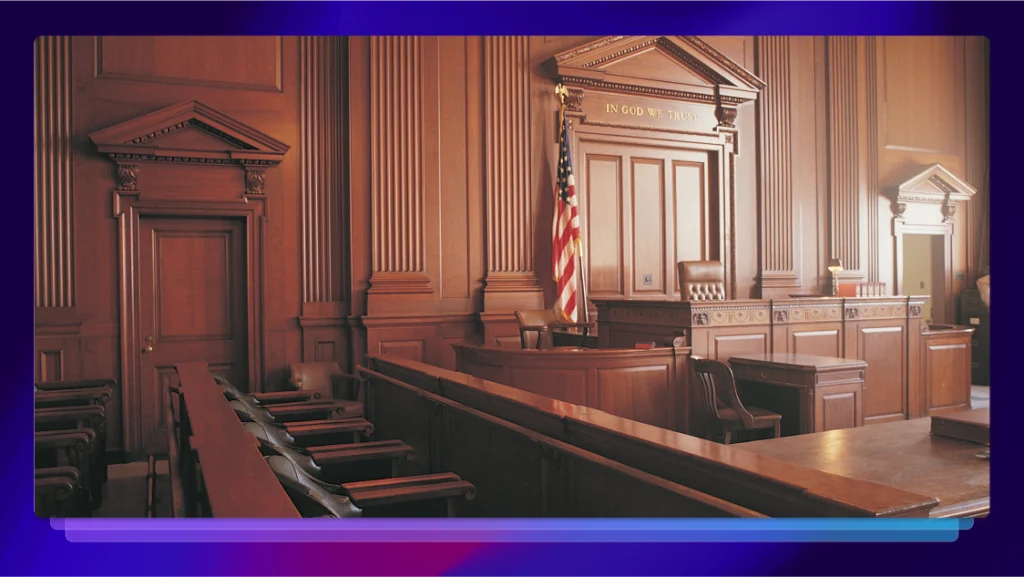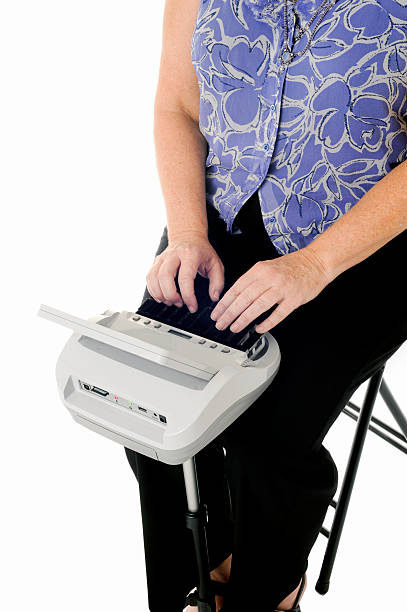Court Typist vs. Stenographer: Exploring the Key Differences
Court Typist vs. Stenographer: Exploring the Key Differences
Blog Article
Discover the Essential Skills and Duties of a Court Typist in Today's Lawful Landscape
As a court typist, you hold a vital setting in the legal system. Your skills exceed simply keying; they entail understanding complicated lawful terms and procedures while making certain precision in every file. You team up closely with courts and lawyers, making your duty essential for efficient communication. Yet what certain skills do you need, and how can you adjust to the ever-evolving technical landscape? Let's discover this better.
The Duty of a Court Typist in the Judicial System
As the foundation of the judicial system, a court typist plays a crucial duty in ensuring that lawful proceedings are precisely documented. You are accountable for transcribing whatever from witness statements to courts' judgments, recording every information with accuracy. Your job helps preserve a clear and long-term document of court tasks, which is important for future referral and appeals.In the court room, you're usually the unrecognized hero, silently guaranteeing that all talked words come to be created records. You maintain confidentiality, understanding the sensitive nature of legal matters. You also collaborate closely with clerks, legal representatives, and courts to assure the smooth circulation of information. By working efficiently under pressure, you contribute to the total effectiveness of the judicial process. Your interest to detail and commitment to precision not only maintain the honesty of the court but also support the broader pursuit of justice in culture.
Vital Abilities Required for Court Typists
Court typists require a distinct mix of abilities to master their important function within the judicial system. You must have exceptional inputting skills, frequently achieving rates of 70 words per minute or even more. Accuracy is essential; even a minor mistake can bring about substantial misconceptions in legal records. You'll additionally require strong focus to detail, ensuring every word is recorded correctly.Additionally, good business abilities are crucial for handling multiple situations and documents successfully. Being tech-savvy is necessary, as you'll utilize various software program programs for word handling and paper management. Solid interaction abilities assist you interact with judges, lawyers, and other court workers effectively.Lastly, a sense of professionalism and discretion is a must, as you'll handle sensitive information daily. By developing these abilities, you'll be well-prepared to add considerably to the courtroom environment.
Comprehending Legal Terms and Treatments
As a court typist, you need to realize essential legal terms and procedures to do your work effectively. Recognizing these principles not only helps you transcribe precisely however additionally assures you can adhere to the circulation of court proceedings. Let's check out the essential legal vocabulary and an introduction of court processes you must understand.

Secret Legal Terms
Recognizing crucial legal terms is important for any individual working in a court room setting. You'll often run into terms like "complainant," which describes the individual launching a claim, and "offender," who responds to the allegations. Recognizing the distinction between "civil" and "criminal" cases helps you grasp the context of the proceedings. Familiarity with "subpoena" warranties you recognize the lawful documents compelling witnesses to indicate. In addition, terms like "proof" and "testimony" are crucial, as they relate directly to the information provided in court. Understanding these terms not only improves your efficiency as a court typist however additionally guarantees that you contribute to the accuracy and clarity of legal records. Your function rests on specific terminology, so do not take it lightly!
Court Procedures Review
Familiarity with key lawful terms sets the phase for understanding court treatments. Understanding exactly how a courtroom features is vital for any court typist. You'll run into processes like accusations, where defendants listen to charges, and motions, which are ask for a court judgment. Familiarize yourself with the roles of lawyers, clerks, and courts, as each plays a crucial part in procedures. Understanding the flow of a test-- from jury option to shutting arguments-- aids you precisely record the proceedings - court typist. In addition, recognizing the significance of preserving a objective and accurate document can't be overstated. By understanding these elements, you'll enhance your efficiency in documenting important court activities and contribute significantly to the lawful procedure. Your duty is essential in preserving the honesty of court records
The Effect of Technology on Court Keying In
Modern technology's changed court inputting in significant ways. With electronic transcription devices, you can enhance efficiency and accuracy, making your task much easier than ever before. Plus, remote court process have actually changed just how you approach your job, requiring flexibility to brand-new styles and technologies.
Digital Transcription Devices
As electronic transcription tools continue to advance, they're changing the method court typists do their tasks. These devices simplify the transcription procedure, permitting you to record talked words properly and successfully. With voice acknowledgment software application, you can record real-time proceedings, decreasing manual input and reducing errors.Moreover, cloud-based platforms allow easy accessibility to documents, so you can function collaboratively with lawful teams and ensure everyone's on the exact same page. Automated format functions conserve you time on repetitive tasks, letting you Resources concentrate on material quality.Additionally, electronic tools improve safety, securing delicate info via encrypted storage and regulated access. By welcoming these innovations, you can boost your efficiency and maintain the high criteria required in the lawful field.
Remote Court Process
The rise of remote court procedures has actually substantially altered the landscape for court typists. You now depend on innovation to catch and transcribe real-time hearings from your office or home. Knowledge with video clip conferencing systems is essential, as you'll need to browse them perfectly to ensure an accurate document. You'll additionally have to manage audio top quality, as background sound or link problems can interrupt your work. In addition, remote proceedings require quick reasoning; you may require to clear up declarations or demand repeats in real-time. Remaining organized and effective is crucial, as due dates stay limited. Accepting these technical innovations not just boosts your abilities yet also guarantees you remain a very useful possession in today's developing lawful atmosphere.
Precision and Interest to Information in Transcription
Accuracy and interest to detail are important in transcription, particularly for court typists. court typist. When you're recording legal proceedings, every word matters. A solitary blunder can modify the definition of a declaration, possibly influencing the end result of an instance. You should pay attention thoroughly, guaranteeing that you catch every nuance and inflection in the speaker's voice.Your capability to catch typos and grammatic errors is necessary. You do not just kind; you verify that the last record is an accurate depiction of what was claimed in court. This requires a keen eye and an extensive understanding of lawful terminology.Moreover, you'll need to be accustomed to different accents and speaking styles, as court rooms can hold a variety of audio speakers. By refining your accuracy and focus to detail, you'll maintain the stability of legal documents and add significantly to the judicial process. Your diligence in this area truly makes a difference

Time Management and Business Abilities
While handling multiple jobs, reliable time monitoring and business skills are important for court typists. You'll typically manage different target dates, from transcribing court proceedings to preparing lawful records. Prioritizing your work is vital; determine immediate tasks and tackle them initially to assure prompt submissions.Organizational skills enter into play when you're sorting with situation notes, records, and documents. Keeping everything neatly classified not just conserves time however likewise minimizes the threat of mistake. Using devices like calendars, to-do listings, or specialized software can aid you stay on track and manage your time effectively.Moreover, establishing specific objectives for every job session can increase your performance. Break bigger jobs into smaller sized jobs to make them much more convenient. By developing these abilities, you'll not just boost your performance but likewise add considerably to the smooth procedure of the legal procedure, guaranteeing whatever runs like clockwork.
Continuing Education and Expert Growth Opportunities
Purchasing your abilities doesn't quit with time monitoring and organization. As a court typist, you'll discover that proceeding education and expert growth are necessary to remaining competitive in the legal area. Seek workshops or online courses concentrating on innovative keying techniques, legal terms, and transcription software. These can hone your skills and assist you adjust to the newest technologies.Networking is similarly crucial. Sign up with description expert companies like the National Court Reporters Organization (NCRA) or local legal associations. They commonly supply sources, training sessions, and conferences that can boost your understanding and link you with peers.Don' t forget certification programs that can enhance your integrity and bankability. Remaining upgraded with the most current patterns and best practices in legal paperwork will certainly enhance your effectiveness and accuracy, making you an important asset to any legal group. Purchase your development, and you'll gain the incentives throughout your career.
Regularly Asked Inquiries
What Is the Regular Income Variety for a Court Typist?
A court typist's common income varieties from $30,000 to $55,000 yearly, depending upon experience and place. You may likewise find opportunities for development with extra skills, bring about raised pay in the find more lawful field.

Are Court Typists Required to Have a Lawful Degree?
Court typists don't need a legal degree, but having one can be useful. You'll often find that solid inputting skills and understanding of lawful terminology are more vital for success in this role.
What Are the Work Hours for a Court Typist?

Exactly How Do Court Typists Ensure Confidentiality in Their Work?
You assure confidentiality by securely handling sensitive files, using encrypted software application, and complying with strict procedures. You stay conscious of personal privacy legislations and only share information with licensed personnel, maintaining count on the judicial process.
Can Court Typists Job From Another Location or Freelance?
Yes, you can function remotely or freelance as a court typist, especially if you have reputable technology and a protected environment. Several legal specialists currently accept remote work, supplying flexibility and possibilities for independent typists. As the foundation of the judicial system, a court typist plays a necessary duty in guaranteeing that legal process are properly documented. As a court typist, you need to realize key legal terms and treatments to execute your job successfully. Grasping these terms not just enhances your efficiency as a court typist yet additionally assures that you contribute to the precision and clearness of legal records. The increase of remote court proceedings has actually substantially altered the landscape for court typists. As a court typist, you'll find that proceeding education and professional growth are crucial to remaining competitive in the lawful area.
Report this page